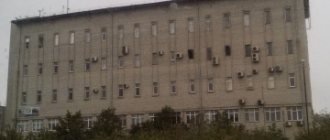Pravozhil.com > Housing and communal services issues > Homeowners' associations > Voting of apartment building owners - vote counting
In accordance with the Housing Code of the Russian Federation (LC RF), the owners of an apartment building must organize general meetings to resolve issues relating to their properties, conduct voting and correctly count votes.
Decisions at such meetings are often of a very important nature and therefore must be made through a fair voting procedure.
Poor awareness of citizens in the legislation of the Russian Federation often provokes incorrect vote counting or makes this event completely impossible.
In order to help readers, today our resource offers material on how to properly conduct the procedure for counting votes and the meeting as a whole.
By a simple majority of votes from the owners participating in the meeting - everything else, for example:
| subject | question |
| Issues related to common property | ✓ on the improvement of the land plot on which the house is located and which belongs to the common property, including the placement, maintenance and operation of landscaping and landscaping elements on such a site (clause 2.1, part 2, article 44 + part 1, art. 46 of the Housing Code of the Russian Federation), ✓ on current repairs of common property in the house (clause 4.1, part 2, article 44 + part 1, article 46 of the Housing Code of the Russian Federation), ✓ on identifying a person authorized on behalf of the owners to submit an application for state cadastral registration and (or) state registration of rights to real estate objects that are part of the common property by force of law, applications for state cadastral registration of an apartment building in connection with a change in its characteristics as a result of reconstruction or during redevelopment of the premises located in it (clause 3.6, part 2 Article 44 + Part 1 of Article 46 of the Housing Code of the Russian Federation). |
| Issues related to the choice and implementation of a control method | ✓ selection of a management method for apartment buildings (part 3 of article 161, clause 4 of part 2 of article 44 + part 1 of article 46 of the Housing Code of the Russian Federation), ✓ choice of a management organization (part 8.2 of article 162 + part 1 of art. 46 of the Housing Code of the Russian Federation), ✓ approval of the terms of the management agreement for an apartment building (Part 1 of Article 162 + Part 1 of Article 46 of the Housing Code of the Russian Federation). In this case, the agreement itself must be signed by the owners who have at least 50% of the votes of the total number of votes of the owners. In connection with the requirement of the Housing Code of the Russian Federation for the owners to sign the agreement with 50% of the votes, there is a point of view that a decision on such an issue should also be made not by a simple majority of those participating, but by more than half the votes throughout the entire house. ✓ refusal to execute the management agreement unilaterally (part 8.2 of article 162 + part 1 of article 46 of the Housing Code of the Russian Federation), ✓ on the reorganization of the HOA by converting it into a housing cooperative or housing cooperative (part 2 of article 140 + part 1 of art. 46 of the Housing Code of the Russian Federation), ✓ on the liquidation of the HOA if its members do not have more than 50% of the votes of all owners (Part 2, Article 141 + Part 1, Article 46 of the Housing Code of the Russian Federation). |
| Questions about the MKD council | ✓ selection and re-election of the MKD council and its chairman, election of owner commissions (Parts 1, 6, 12 of Article 161 + Part 1 of Article 46 of the Housing Code of the Russian Federation), ✓ on establishing remuneration for members of the MKD Council, including the chairman (Part. 8.1 Article 161 + Part 1 Article 46 of the Housing Code of the Russian Federation) ✓ on the term of office of the MKD council (by default – 2 years) (Part 10 of Article 161 + Part 1 of Article 46 of the Housing Code of the Russian Federation), ✓ on the use of the information system in the activities of the council of MKD and its chairman, commissions of owners in the event of their election, as well as on the determination of persons who, on behalf of the owners, are authorized to ensure the activities of the council, chairman, commissions (part 13 of article 161 + part 1 of article 46 of the Housing Code of the Russian Federation ). |
| Issues regarding holding general meetings | ✓ on financing expenses associated with convening and organizing a meeting by the management organization, the board of the HOA or cooperative in accordance with Part 6 of Art. 45 of the Housing Code (clause 3.5, part 2, article 44 + part 1, article 46 of the Housing Code of the Russian Federation), ✓ on the method of sending to the owners a message about holding a general meeting or on a location accessible to all owners for posting such messages (part 4, art. 45 + part 1 of article 46 of the RF Housing Code), ✓ on the timing of the annual general meeting (part 1 of article 45 + part 1 of article 46 of the RF LC), ✓ on the place (address) of storing copies of minutes of meetings and decisions of owners (Part 4 of Article 46 + Part 1 of Article 46 of the Housing Code of the Russian Federation), ✓ on the premises accessible to all owners, in which the initiator posts the results of the meeting (Part 1 and Part 3 of Article 46 of the Housing Code of the Russian Federation), ✓ on using the information system when holding a general meeting of owners in the form of absentee voting (clause 3.2, part 2, article 44 + part 1, article 46 of the Housing Code of the Russian Federation), ✓ making decisions on identifying persons who, on behalf of the owners of premises in an apartment building, are authorized to use of the system or other information systems when holding a general meeting of owners of premises in an apartment building in the form of absentee voting (hereinafter referred to as the administrator of the general meeting) (clause. 3.3 hours 2 tbsp. 44 + part 1 tbsp. 46 of the Housing Code of the Russian Federation), ✓ deciding on the procedure for the administrator of the general meeting to receive messages about holding general meetings of owners of premises in an apartment building, decisions of owners of premises in an apartment building on issues put to vote, as well as on the duration of voting on issues on the agenda of the general meeting of owners premises in an apartment building in the form of absentee voting using the system (clause 3.4, part 2, article 44 + part 1, article 46 of the Housing Code of the Russian Federation) |
| On the transition to direct contracts | ✓ on the conclusion by owners, acting on their own behalf, of agreements containing provisions for the provision of utility services, an agreement for the provision of services for the management of MSW with resource supply organizations and the regional operator for the management of MSW (Clause 4.4, Part 2, Article 44 + Part. 1, Article 46 of the Housing Code of the Russian Federation), ✓ on the date of concluding agreements containing provisions on the provision of utility services, contracts for the provision of services for the management of MSW with resource supply organizations and the regional operator for the management of MSW (Clause 1, Part 7, Article 157.2 + Part 1 of Article 46 of the Housing Code of the Russian Federation). |
| About payment | ✓ on determining the amount of expenses for payment of utility resources consumed during the use and maintenance of common property based on the average monthly volume of their consumption, with recalculation based on the indications of the ODPU or based on the volume of consumption determined by the ODPU (Part 9. Article 156 + Part. 1, Article 46 of the Housing Code of the Russian Federation). |
| Resolving issues related to direct house management | ✓ on the conclusion of contracts for the provision of services (performance of work) for the maintenance and repair of common property in a house with direct management (part 1 of article 164 + part 1 of article 46 of the Housing Code of the Russian Federation), ✓ on a person authorized to act in relations with third parties on behalf of the owners in a house with direct management (part 3 of article 164 + part 1 of article 46 of the Housing Code of the Russian Federation) |
| All other issues within the competence of the general meeting of owners (clause 5, part 2, article 44 of the Housing Code), for example: | ✓ on refusal to indicate barcodes in the payment document when managing a house of an HOA or cooperative (subclause k(1) clause 69 of the Rules for the provision of public utilities No. 354 + part 1 of article 46 of the Housing Code of the Russian Federation), ✓ on addition to the list of “other documents” related to management, not specified in clause 26 of the Rules for the maintenance of common property No. 491 (subparagraph “e” of clause 26 of the Rules for the maintenance of common property No. 491+ part 1 of article 46 of the Housing Code of the Russian Federation) ✓ on the conclusion of an energy service agreement (contract) (clause 38(2) of the Rules for the maintenance of common property No. 491 + part 1 of article 46 of the Housing Code of the Russian Federation). |
Some wording in the law is not directly indicated, so the initiator has questions about where to include them, because the number of votes will depend on this: Is the barrier an improvement or about the limits of use of the land? Is a partition in common areas just a redevelopment or a reduction in common property? Is sealing a garbage chute some kind of reconstruction or reduction of common property, or is it simply a choice of waste collection method? Is installing video surveillance the use of common property, refurbishment or none of the above?
Initiators should focus on local judicial practice, or they can ask the housing inspector in advance.
Content
The information that must be indicated in the document is determined by clause 5.1 of Article 48 of the Housing Code:
- information about the owner of the premises - the voting participant (for a citizen, the full name must be filled in; for an organization, its name must be filled in);
- details of the document confirming the voter’s ownership of the premises in the house;
- all issues put to vote on the agenda and the decision on each of them are written down.
The document contains the date of completion and the personal signature of the person who voted. Additionally, the final date and address for receiving ballots are indicated in the form of a memo.
Voting of apartment building owners - vote counting
How are votes of owners counted at a meeting?
Special attention in the procedure for the general meeting of owners of an apartment building requires, of course, the calculation of the results obtained.
The procedure for counting votes is quite simple if you look at its basic principles. The general list of these is as follows:
- The counting of votes received when residents vote at the OSS is carried out directly using the compiled register and its data. According to the generally accepted norm, 1 square meter of property of each voter is taken as one vote. That is, if the owner, say Mikhail, individually owns (or jointly with his wife) an apartment of 75 square meters and voted at the meeting, then on his behalf the same 75 votes are counted in the general list of such votes. And, for example, another tenant, Irina, owns an apartment of 40 square meters together with her ex-husband on the basis of shared ownership in equal parts, then in this case, Irina’s votes are considered to be that part of the footage of her property in the apartment building that is in her official possession , that is, 20 square meters.
- During the voting process, apartment building residents have the right to vote either to resolve the issue that has arisen, or to ignore it, or to keep their vote to themselves altogether. Thus, when counting votes, three basic units are taken into account: “FOR”, “Against” and “Abstained”.
- As a rule, the initiator of this event is responsible for counting the votes received in voting at the OSS. The counting of votes at the general meeting of owners of apartment buildings is carried out according to a formula. The final decision is made based on the majority of votes received during the voting, taking into account those residents who participated in it. For example, the owners of 3,000 square meters gathered at the OSS MKD with an area of 4,500 square meters. Residents who own a total area of 2,200 square meters voted to resolve the issue in a specific way. Thus it turns out: (2200 * 100%) / 3000 = 73.3% - residents voted for the solution to the issue, which means it will be accepted as mandatory.
General aspects of organization and conduct
The event can be initiated by both HOA participants and board members. a notification and a bulletin are sent to each resident participating in the procedure by registered mail .
It is also not prohibited to hand over documents in person, but then the tenant must sign for receipt.
The voting owner sends his ballot to the counting commission at the specified address. After the votes are counted, the result is communicated to the participants at a meeting or through an announcement.
The legislation imposes certain requirements on the decisions made by the owners of apartment buildings:
- the decision must be made in writing. That is, the initiator of the event must provide the HOA members in advance with the opportunity to indicate their opinion on special forms;
- the form (bulletin) must be filled out and signed by the owner of the property;
- the document must contain information identifying the HOA member.
Voting procedure and rules
Voting in an apartment building - how to count votes?
After we have understood the essence of the general meeting of residents of the house, we can study in more detail the procedural side of voting at such meetings.
In the legislation of the Russian Federation, the voting procedure is considered in sufficient detail. But it can not be understood by every citizen of our country, since the interpretation of all concepts is carried out in a “legal language” incomprehensible to the average person.
In fact, the essence and general principles of voting at the OSS are extremely simple and easy to understand. To make it easier to understand the meeting procedure, we will provide the following information:
- Firstly, a meeting of residents can be carried out in three forms:
- in-person gathering, that is, a meeting in the direct presence of all residents of the apartment building;
- absentee collection, that is, a meeting at which decisions are made in writing by each resident of the apartment building;
- in-person collection, that is, a meeting at which decisions are made in the manner of both in-person and absentee collection.
All types of OSS are absolutely legal and competent. The main thing is that during their implementation the basic norms of this procedure are observed.
- Secondly, when organizing a meeting and subsequent voting, it is important to maintain a quorum, that is, a certain number of residents taking part in the meeting and directly voting. According to current laws, the quorum at the OSS is determined by the area of housing. In accordance with the Housing Code of the Russian Federation, a quorum is considered to be met if the owners of more than 50% of the residential area of the apartment building are present at the meeting. Otherwise, it is impossible to conduct the OSS and, accordingly, voting.
How to hold a meeting - detailed instructions
To conduct absentee voting, the following sequential steps are required:
- First of all, citizens should be notified of the need to conduct absentee voting. This can be done remotely by posting data on an information resource on the Internet, or by personally contacting each resident by calling or visiting apartments.
- After this, a ballot is drawn up, in which the option that the residents liked most should be put.
- On the specified day, all owners of areas in apartment buildings receive completed ballots for apartments, and also, each owner who is given voting papers is warned about the deadlines for delivery.
- At the end of the time given for voting, HOA employees must go door-to-door and pick up ballots.
- A specially formed commission calculates the results and indicates which decision received the maximum number of votes.
- Citizens are notified of the results of the voting by announcement at the entrance, on an information resource, in the media, or by door-to-door visits.
- If desired, citizens who believe that the decision was made illegally can appeal it in court. To do this, you need to form an initiative group, hire a lawyer, and write a statement of claim to protect the rights of owners.





